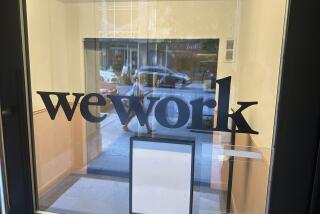Filing Stops Ex-Global Employees’ Severance
- Share via
By the time Global Crossing Ltd. filed for bankruptcy last week, Alan Moffatt had already come to accept a $50,000 loss on the company’s stock and a 60% drop in the value of his retirement plan.
What he didn’t expect was that four months after being laid off by the struggling telecommunications firm, the final indignity was yet to come. Global Crossing’s bankruptcy, the fifth-largest in U.S. history, brought his severance payments to a sudden halt.
Across the country, Global Crossing shareholders are absorbing the financial shock of watching their stock become instantly worthless and employees are fretting about the damage to their company-sponsored 401(k) plans.
Thousands of laid-off workers are having to digest those losses while finding ways to make ends meet without the severance benefits they had been promised.
The unexpected loss of income has brought the workers a sudden degree of hardship and uncertainty at a time when much of their stock savings have already evaporated and jobs in the telecommunications field are notoriously scarce. The telecom industry shed more than 175,000 U.S. positions last year.
Moffatt, the company’s former vice president of sales for the Pacific Northwest, has spent the last 10 days searching for ways to make do without the severance check and health benefits that were worth nearly $18,000 a month.
“We’re taking a closer look at everything,” said Moffatt, who lives in the Seattle suburb of Bellevue and counted on the severance for 80% of his family’s income. “We’re strongly considering putting our house on the market, all because of the bankruptcy.”
Global Crossing, which now has 8,000 employees, has laid off more than 2,000 workers since the summer, and nearly all of them were offered severance packages. The company doesn’t know how many of them had their payments interrupted by the bankruptcy filing.
In a letter posted on Global Crossing’s Web site, John Comparin, executive vice president for human resources, told “recently separated employees” that bankruptcy laws prohibit the company from continuing its severance payments without approval from the U.S. Bankruptcy Court. The company has not asked for permission.
Global Crossing’s bankruptcy filing puts severed employees in the same category as creditors like Lucent Technologies Inc., which claims to be owed at least $123 million. Bankruptcy attorneys predict the ex-workers will see only pennies on the dollar.
Bankruptcy law allows for employees to collect up to $4,300 for back pay, commissions, severance, unreimbursed expenses and the like, before the rest of the company’s assets are divided up among creditors, said Kenneth Klee, a bankruptcy expert at UCLA law school.
When large companies file for Chapter 11 protection, former employees usually get their full $4,300 in priority claims, though not the rest of the severance they are owed, he said.
Global Crossing could have ensured that the laid-off workers received their full severance benefits by paying them in a single lump sum, said Melanie Cohen, a Chicago bankruptcy attorney and past chairwoman of the nonprofit Turnaround Management Assn.
Instead, they will be considered alongside other unsecured creditors.
“If they had wanted these people to have some money, they could have found a way to do it,” Cohen said. Now, “it’s really up to the bankruptcy judge. There’s just not enough to go around.”
Global Crossing preferred to spread the payments out so that laid-off workers could continue receiving health insurance at employee rates, said spokeswoman Tisha Kresler.
To former employees like John Sidline, the well-intentioned plan now seems ill-conceived. The loss of his severance--a five-digit figure that was to be paid over a year--is making a bigger financial impact these days than the loss he took on the company’s stock.
“It hurts,” said Sidline, a Global Crossing public relations and product manager who was let go in July and has been supporting his wife and two young daughters since then on his severance. “We’re reacquainting ourselves with tuna fish. We’re making sure the heat’s not up to 70 in the house. We’re tightening our belts where we can.”
Sidline invested nearly $10,000 in now worthless company stock. He left well over $100,000 on the table as he waited in vain for the share price to hit $70 so he could cash in his stock options.
But the stock options were only “potential money,” and the cash spent on shares “was already paid.” As the stock price fell, he reduced the proportion of his 401(k) that was invested in Global Crossing to 5%, down from a high of 25%.
Since the bankruptcy filing, Sidline also widened his job search and is now willing to consider jobs with lower salaries, outside his area of expertise, and farther from his home in Lake Oswego, Ore.
“I never had that sense of urgency because of the severance,” he said. “Now I’m going to take whatever job comes along that will pay the bills.”
Leonard Maggiore, who was laid off from Global Crossing’s Sunnyvale, Calif., office in August and is owed more than $43,000 in promised severance, said forcing workers to share the burden with corporate creditors is unfair.
“Companies like Lucent and Cisco can sustain this kind of loss with minimal impact,” said Maggiore, who was a senior product line manager. “They’re slapping a lot of people who spent hours building their network, talking to customers and advocating for the company. Those are the people they should be most concerned about.”
Maggiore is using the Internet to gather a virtual community of former Global Crossing employees so they can devise a strategy to fight for their severances in court.
“Clearly I can’t afford my own lawyer to pursue this,” he said. “We need to fight for what’s ours because the courts aren’t.”
More to Read
Inside the business of entertainment
The Wide Shot brings you news, analysis and insights on everything from streaming wars to production — and what it all means for the future.
You may occasionally receive promotional content from the Los Angeles Times.











